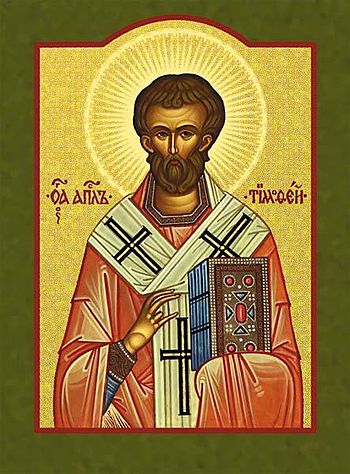 |
| Saint Timothy (ortodox icon) (Photo credit: Wikipedia) |
Opening thought:
What guidance does the Bible offer in the important matter of setting men apart for Christian ministry, and in our case today, of deacons?
Surprisingly little is said in the New Testament about ordination. The OT precedent comes from the setting apart of Aaron and his sons as priests in Leviticus 8 when Moses sprinkled them with the blood from the sacrifice and anointing oil, signifying the cleansing of Jesus Christ and the power of the Holy Spirit, and then laid hands on them to set them apart for ministry.
Textual Notes: While the NT does not teach ordination as a sacrament of the church, it is important in setting apart leadership for her. Baptists believe in a personal, divine call to Christian ministry, and they have historically insisted on a procedure of ordination of those who have felt called and at the same time that indicates a confirmation of that call on the part of the congregation.
It is the congregation that sets apart, not the leadership or ordination council. It is the job of the ordination council to make a recommendation on the fitness of a person for ministry. It is the church which sets apart. It is the leadership which then appoints.
There is no description of an ordination service in the NT, but there is ample warrant for a simple ceremony of setting apart those who have proved themselves called of God to ministry.
INSIGHTS: Ordination is a process of acknowledging one who is
1. Called and equipped by God (6:3, 5, 6)
*“full of the Holy Spirit and wisdom”
*Jesus called his disciples (Mark 3:14; John 15:16; John 20:21-23)
2. Nominated and affirmed in his call by the church (6:3)*“Brothers, seek out from among you seven men of good reputation”
*The church at Antioch set apart Saul & Barnabas (Acts 13:2-4)
3. Appointed by the leadership (6:3)*“whom we may appoint over this business”
*Saul & Barnabas ordained elders from among the new churches (Acts 14:23) and told Titus to do the same (Titus 1:5).
4. By the imposition of hands and prayer (6:6)*“and when they had prayed, they laid hands on them.”
*Timothy was ordained by the church and Paul in this manner (1 Timothy 4:14; 2 Timothy 1:6)
*The imposition of hands in the OT represents God’s commission, blessing, and equipping for service (Levitical priests - Numbers 8:10; Joshua – Numbers 27:18-23 & Deuteronomy 34:9; Jacob - Genesis 48:1-20)
*We are admonished not to be too hasty in laying on hands (1 Timothy 5:22)
APPLICATION:
When leaders are called, chosen, and appointed in a Biblical manner, the church will be blessed and grow (Acts 6:7: Then the word of God spread, and the number of the disciples multiplied greatly in Jerusalem, and a great many of the priests were obedient to the faith.)
INVITATION

Gene,
ReplyDeleteNot really looking for an argument here, but, since you posted on this question, just thought I would run my ideas by you, which are slightly different from the traditional Baptist understanding and practice, and see if you can help me see where I might be wrong...
From a New Testament point of view, I don't see where there should be any difference between "ordination" and "pastor installation." I agree that it is necessary to publicly recognize a new pastor and his responsibilities in a local church, and that it is not a bad idea to have some representative people lay hands on the new pastor, as a symbol of his ministry at that church being commended to the Lord, and invoking the Lord's blessing.
However, whenever a pastor of a church, for whatever reason, quits being pastor of that church, I don't see a biblical justification for him continuing to be recognized as a "pastor" until another local church happens to recognize him as their pastor.
The office of pastor (or "bishop" or "elder", to use other biblical terms), the best I can make out, is a local church office. Pastors should thus, in my opinion, be accountable to the local church in which they serve for the exercise of their ministry.
If, for example, a pastor acts in such a way that necessitates the local church in which he serves to remove him from his pastoral responsibilities in that church, I do not believe it should be up to the church that "ordained" him, if it is another church, to also revoke his ordination. But this is a situation which often arises, due to our tradition of generally "ordaining" people into the "Gospel ministry" at large.
I prefer to believe that all of us, as believers, are "ordained" into the "Gospel ministry" at large, at the moment of our conversion.
David, Thanks for your comments. I agree with much of it. I used to not want to be ordained like DL Moody took so much pride in. I thought ordination was just a way to help with taxes. But since being ordained in 2003 following several years of para-church ministry, I immediately experienced a new surge of anointing that I had not known before.
ReplyDeleteI think that once ordained, it is a life call, and yes, I agree that the priesthood of all the body of believers is "ordained" for the Great Commission and ministry in the name of Jesus. But I do hold to the idea of an office that ordination initiates for a leader.
My great respect to you as a missionary in Spain.